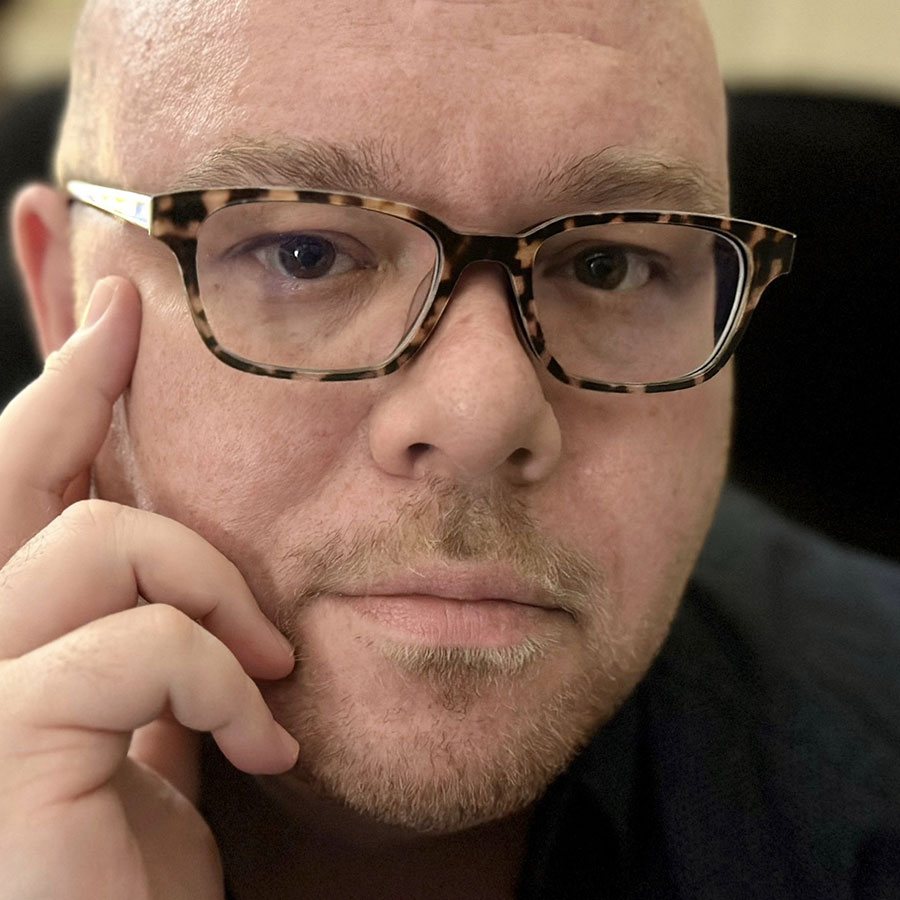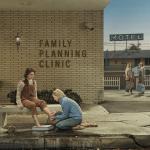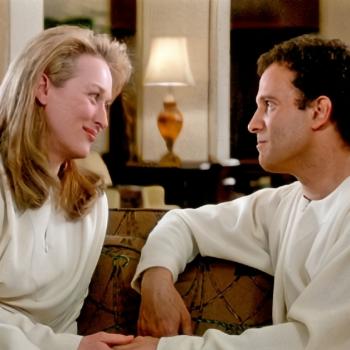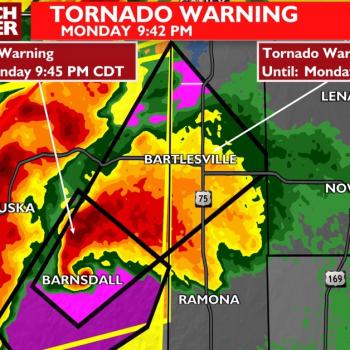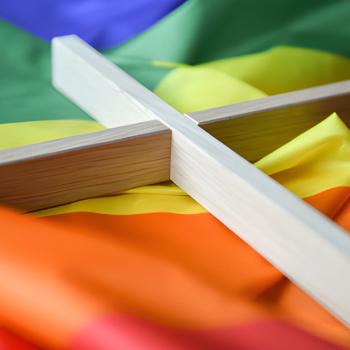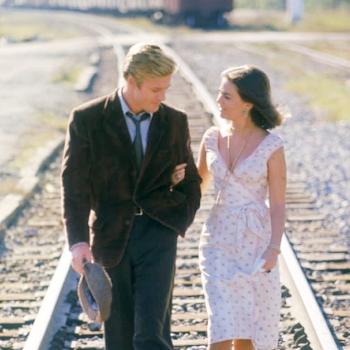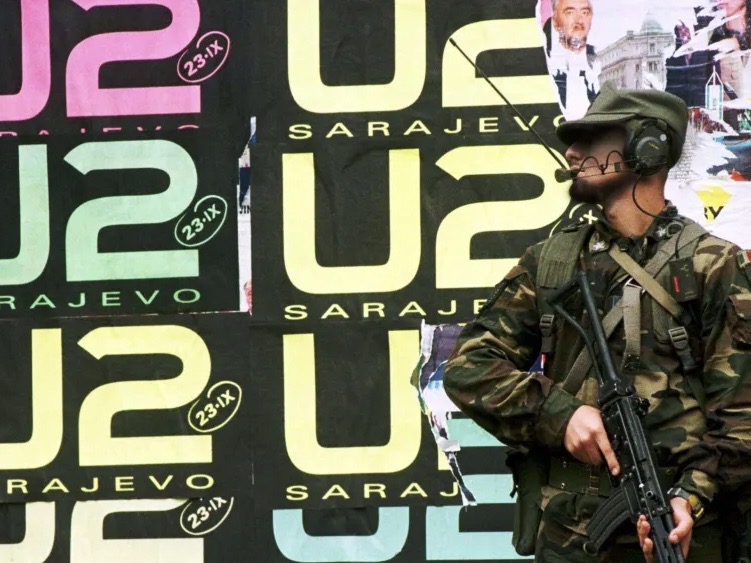
Faith on Film is a monthly feature published the last Sunday every month.
For too many in this world, hope is not an everyday occurrence.
Sometimes it seems as if the tragedies of our existence become so commonplace that we lose the core of who we are and become incapable even of outrage.
This was the reality of life in Sarajevo thirty years ago. In the aftermath of fall of the Berlin Wall, ethnic and nationalist tensions erupted when Bosnia and Herzegovina declared independence from Yugoslavia. Yugoslavian leader Slobodan Milošević sought to reshape the region by supporting Bosnian Serb forces in a campaign against Bosniak and Croat populations. This initiative, marked by widespread war crimes, notably included horrific genocide that targeted Muslims.
When thousands of soldiers surrounded the diverse multiethnic city of Sarajevo, ordinary everyday citizens became sniper targets. But, as others have noted, it’s a slow fade when darkness pulls the strings, black and white have turned to grey, and if you think you stand you just might be sinking. “You’re sleeping; you wake up, and you realize you woke up in a war,” said one man who survived the 1,425 day siege of Sarajevo that spanned from April 1992 until February 1996.
The shock of this quote in the documentary Kiss the Future was felt more in my heart than my head. I wonder if the three or four other people in the darkened IMAX theater felt the same way; after all, we were all approximately the same age and appeared to have the same faded uniform of old U2 concert t-shirts.
Here is the trailer:
“You’re Really Doing Nothing for Us”
To be clear, I didn’t expect to see a concert film by any means. And though I had a cursory knowledge of what happened in Sarajevo a generation ago, my contemporaneous memories of news coverage was extremely slight—a problem the film addresses head on.
One of the interviewees invites us to imagine if New York City fell under attack by the US military: with the city’s infrastructure demolished, children dodge sniper fire to go to schools without water, and the few bullet-riddled hovels powered by generators erupt in arson fires intended to target and entrap first-responders.
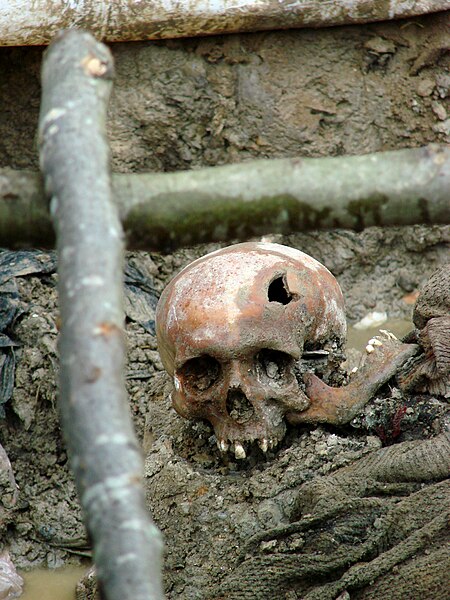
Journalist Christiane Amanpour tells of how her CNN videographer was shot in the face by a sniper in Sarajevo. But no matter the cost of human suffering, American media preferred the trashy drama of Amy Fisher, Lorena Bobbitt, and Tonya Harding to the unspeakable horror of everyday life in Sarajevo. Even the United Nations and the Red Cross declined to send aid to Sarajevo.
But people still wanted their MTV.
In the void left by the inattention of the West, small independent organizations with personnel willing to risk their lives did what they could in Sarajevo. When one such humanitarian aid worker named Bill Carter traveled to the besieged city, he found underground discotheques blasting punk rock and the youth of the city gathered around the only working televisions watching MTV by satellite.
As Carter ingratiated himself within the blooming youth subculture and sparse television broadcasters of Sarajevo, he devised a crackpot plan to interview Bono, lead singer of multi-platinum Irish rock band U2, at a concert in nearby Verona, Italy, by forging a request on Bosnian TV letterhead via fax. It worked, and backstage on videotape Carter talked Bono on behalf of U2 into not only playing a concert in Sarajevo, but helping to spread the word of the daily genocide in Bosnia to the rest of the world.
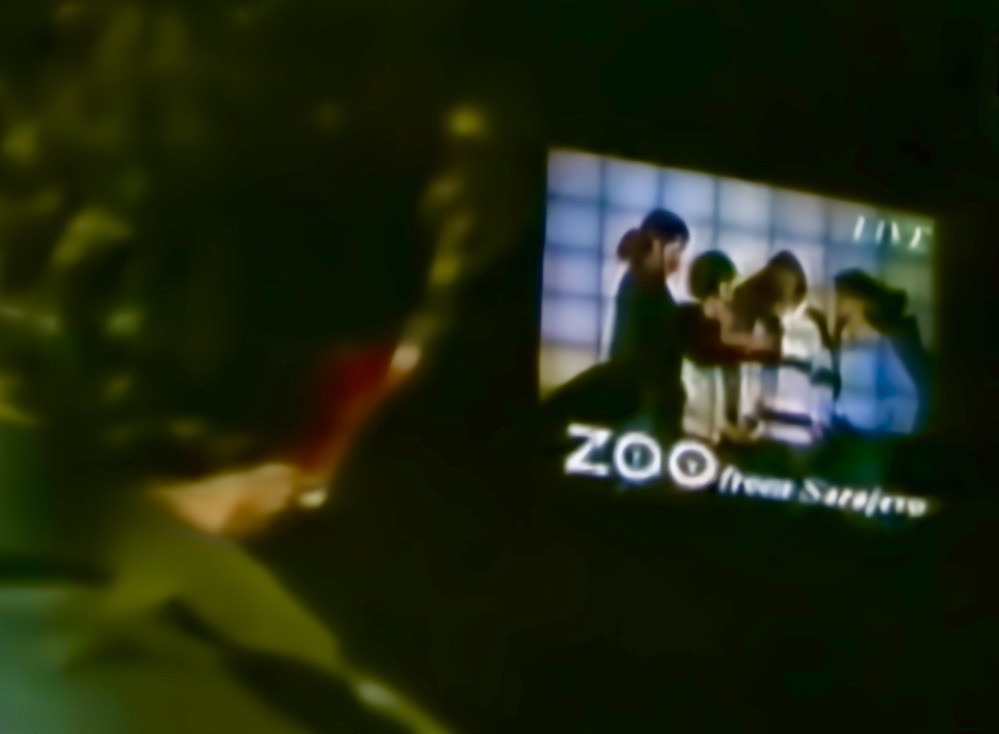
During the European leg of U2’s ZooTV world tour supporting their hit albums Achtung Baby and Zooropa, mid concert, Bono would connect to Carter by satellite and give their concertgoers a double-dose of life and death in war-torn Sarajevo. “We are with you, Sarajevo,” Bono would say on any given night. “We have over 50,000 people here tonight.” The band intended the stories emerging from Sarajevo to move their fans, and to mobilize uncaring Europeans and Americans. During these satellite linkups, Bono was the opposite of his on-stage rock-star persona: “We feel rather ridiculous tonight being in a rock band, considering your reality.”
But these efforts failed on both fronts: not only did the sparse media attention from these chats focus more on U2 than Sarajevo, those being interviewed also felt they were being used. “We would like to hear the music, too, but we hear only the screams of wounded and tortured people and raped women,” said one Sarajevo interviewee during a Glasgow concert. Later, another victim of violence in Sarajevo told Bono and tens of thousands U2 fans gathered in Wembley Stadium, “You’re really doing nothing for us. You’re going to go back to a rock show. You’re going to forget that we even exist. And we’re all going to die.”
Don’t Let Them Kill Us
It could have been a poorly-lit dance hall, clean but small. On stage, ten young women in cheap, one-piece bathing suits walk and turn, smiling at the camera. There is something at the edges of our perception warning us that not everything is as it seems; something is amiss. As captured on grainy videotape, their smiles, though genuine, seem somehow haunted. In the background, we see a block-lettered sign written in Croatian that we intuit must announce the event happening before our eyes: The Miss Sarajevo Beauty Pageant.
The contestants synchronize in a single line formation, each facing to our left, and then collectively begin to unroll something. It takes several seconds for the simple blue and white banner to be painstakingly unfurled; it stretches across the entire stage in front of the beautiful women, filling our field of vision. Before their gleaming smiles, it reads, DON’T LET THEM KILL US.
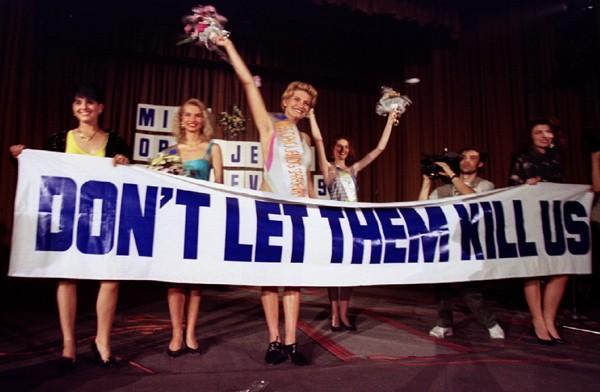
War takes and does not give, but these women refused to allow the war to rob them of their humanity. And that is exactly what they were asking the rest of us to find.
Inspired by their plea for survival, U2 collaborated with producer/musician Brian Eno and opera vocal artist Luciano Pavarotti to record and release “Miss Sarajevo.” The song lyrics depict the pageant contestants maintaining their dignity and poise while begging for help that does not come.
More than a news report or concert publicity scheme, the song weaponized the siege of Sarajevo as a work of art that was able to penetrate the noise of a tabloid-addled public helplessly addicted to Hard Copy, Geraldo, The National Enquirer, and A Current Affair.
The film makes it clear that increasing pressure upon the international community by countries including the United States prompted UN and NATO involvement. The US carried out airstrikes on behalf of NATO beginning in February 1994, and after other bombings resulted in what some estimate to be a total of 329,000 casualties, Milošević finally was forced to sign the Dayton Peace Accords, finalized on December 14, 1995 in Paris.
But for those who had survived the living hell of Sarajevo, would the absence of terror really make peace?
Viva Sarajevo
At the 1984 Winter Olympics in Sarajevo, Koševo Stadium had been renamed Olympic Stadium and hosted the opening ceremonies. I remember people in colorful outfits coming together to form the letters SARAJEVO over the white field in the center of the stadium, with over 18,000 people surrounding them in peace.
During the siege of Sarajevo when 18,000 soldiers surrounded the city, the stadium had been badly damaged, and was used as a morgue. It’s wooden seats were refashioned into coffins for the dead, who were then buried in shallow graves on either side of the stadium.
But U2 had made a promise to perform a concert in Sarajevo, and committed to come to Koševo Stadium during their PopMart tour. Despite persistent reports of regional instability in Bosnia, the band declined a $4 million offer to do a Basel, Switzerland show on the same day. At one point, they considered performing a scaled-down benefit concert instead, but ultimately decided against it. The city had an unemployment rate of 50%, and the “full concert experience” meant tens of millions of dollars of revenue would flood the local economy.
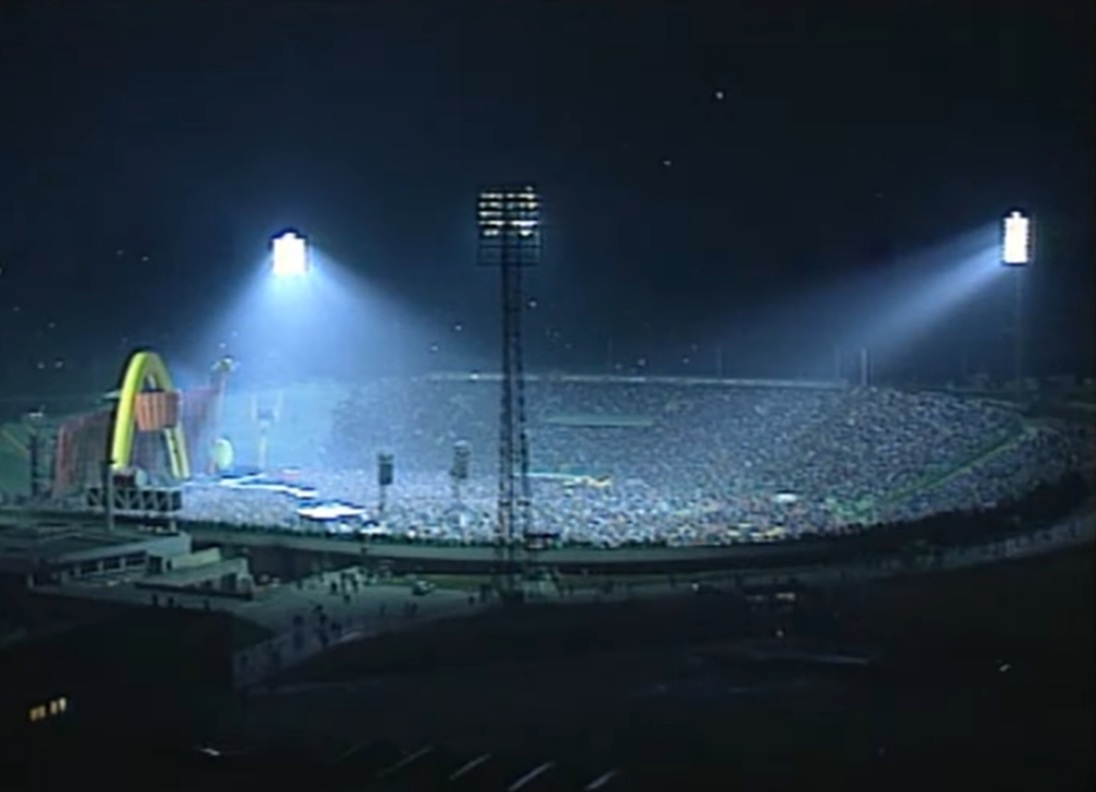
The band paid not only for the stadium to be restored, but also the neighboring Olympic Hall Zetra indoor arena that had been decimated by shelling during the war. Meanwhile, Bono and his bandmates stayed in damaged rooms at the Holiday Inn still pockmarked by bullets and shrapnel.
Trains ran into Sarajevo for the first time since the war began on the day of the concert, September 23, 1997. 45,000 people were in attendance. After local opening acts warmed up the crowd, U2 took the stage. “The war ended the moment they appeared on stage,” said a member of the audience. “All of a sudden, life is back. People are together, singing together, laughing together.”
For a city that had endured the worst humanity had to offer, they were reunited in hope, with a resolve to love one another. “Viva Sarajevo!” cried Bono, his voice failing towards the end of the concert. “F–k the past! Kiss the future!”
Enjoy Yourself (It’s Later Than You Think)
I watched the documentary in the cool, almost deserted theater expecting more of a celebration than a lesson, but I should have known better, knowing U2 as I do.
It is quite obvious the filmmakers intended the narrative of the documentary to provoke a prescient awareness of the political landscape that the United States now inhabits. How a lunatic like Slobodan Milošević could wield insincere nationalism and bigoted xenophobia to divide a culturally diverse populace in civil war would seem almost unthinkable if it had not almost happened right here in the USA almost four years ago. And it well could happen here quite soon.
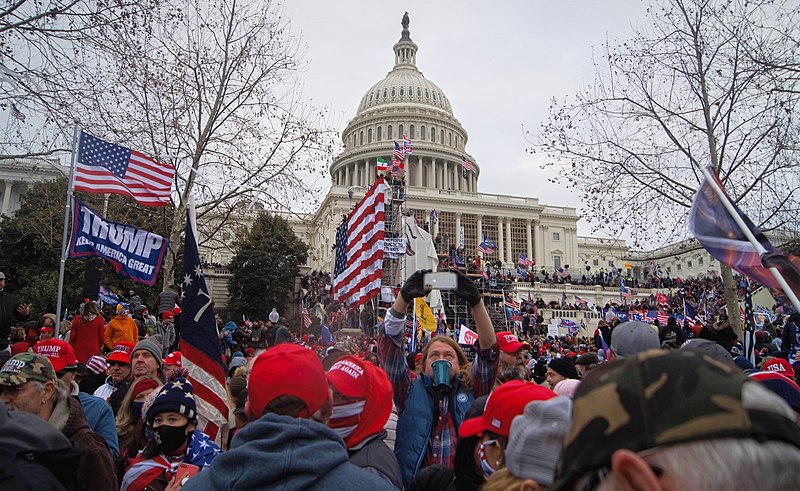
The present we have is fragile. It isn’t exactly peace when you turn on the TV and see the Capital stormed by armed vigilantes attempting to overthrow the government at the encouragement of its president. The water in the pot has been getting hotter and hotter, but like the frog, we sit and wait, unaware how limited our days and minutes in this boiling world may be.
One day when we wake up and we are surrounded, will we even know how we got here?
Today, media personalities like Tucker Carlson shill propaganda for Vladmir Putin and Russia. And considering the role of NATO in events like the Bosnian War, remembering Donald Trump said he would encourage Russia to attack NATO allies makes tomorrow a bad time for anyone who disagrees with the GOP’s presumptive presidential nominee.
But the lesson of Sarajevo is one not of fear, but of humanity, that we don’t become a monster in order to defeat monsters. To kiss the future is to embrace not only hope but forgiveness. It’s the way of the cross rather than the sword.
Ecclesiastes says there is a time for everything—and sometimes, there is a time to coexist, to love your enemies, and pray for those who persecute you. Sometimes, the right time for a beauty pageant is in the middle of a bloody siege, and the perfect time to love and affirm the LGBTQ+ community is when all of the bullies on social media tell you that you’re going to hell.
The courage to love others is a pursuit worth living for, and even worth dying for. May we not forget it.


